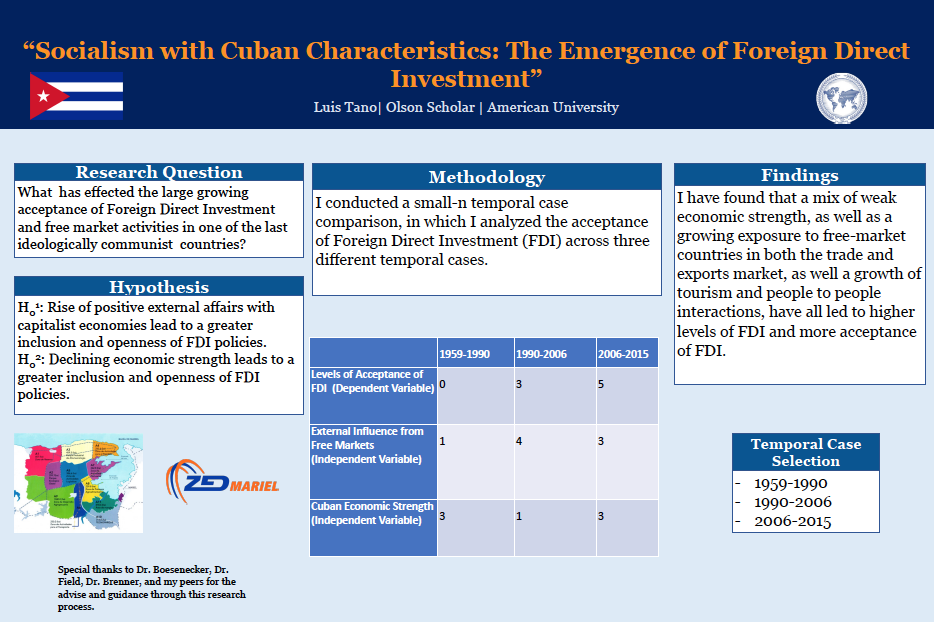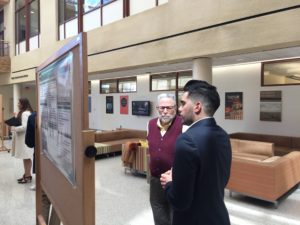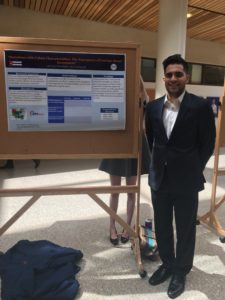Posts in Category: Mentorship
SIS Undergraduate Research Poster Conference
On Friday, April 20, 2018, I presented in the SIS Undergraduate Research Conference at the School of International Service, American University.
Mentor Post
On Thursday, March 8, 2018, Professor Brenner and I met for about an hour and discussed the operationalization of my variables and different data collection strategies. Dr. Brenner had many interesting ideas about how I could measure levels of external influence which I plan to include in the future of my research. Dr. Brenner suggested that I could create a mix of trade, tourism, and official dialog to measure my external relations variable. For my next variable, Cuban economic strength, I suggested to Dr. Brenner that I could use GDP, but he suggests that change in GDP could be a more useful data set. When discussing my dependent variable Dr. Brenner suggested that I take into account more variables when measuring levels and acceptance of FDI. At first, I was simply planning on just measuring different business deals and FDI projects, however, Dr. Brenner suggested that I also look into the mentioning of foreign products in the official discourse. These suggestions are all very important for the data collection and analysis portion of my research.
Mentor Post
On Wednesday, February 7, 2018, Professor Brenner and I met for about an hour for the first time this semester to discuss the future of my research. We discussed some of the future paths my research can take in terms of methodology. We also addressed some of the different historical aspects that I have to take into account in my research like Cuba’s dual currency. Professor Brenner has since then sent me different articles to better understand the role of dual currency in my research area.
I presented Dr. Brenner with the idea of conducting a discourse analysis for my research in order to focus on the shift of official discourse. I got this idea from the Collective Advising Workshop, many professors noted that one of the most interesting aspects of my research question is the possible shift in discourse. The professors suggested that I look into a discourse analysis in order to have a complete focus on the official discourse of the Cuban government stance towards FDI. Dr. Brenner noted that I did have no need to conduct a discourse analysis in order to convey the importance or message of my research. By conducting a case-study approach I can still highlight the shift in government discourse with the right variable operationalization.
I also asked Dr. Brenner about different sources I can use to incorporate the popular discourse of the Cuban people. This is a rather fine line since many blogs centered around Cuba are solely focused on attacking or defending the Cuban government and there are very little non-partisan blogs. He did recommend I explore the blogs: OnCuba, Cuba Possible, Espacio Laical, CubaDebate, Temas, and explore different song lyrics of artist that comment on Cuba’s economy. I plan on utilizing most of these sources in a variable that measures the unofficial discourse in Cuba centered around the implementations of FDI.
RPP #10 Final Mentor Meeting
On Monday, December 11, 2017, at 11:00 am, Professor Phillip Brenner and I met for about two hours for the final time of this academic semester. We discussed some current events of Cuba, his upcoming trip conference trip, and what the political future of Cuba holds. We also discussed my year in terms of research; I told him my puzzle, the presence of FDI in Cuba, and walked him through my small-n case study design.
Prof. Brenner agreed with me that Foreign Direct Investment is a very interesting and important topic to cover when it comes to Cuba. When I presented him with my design he made a number of great suggestions that would benefit my research. First, he suggested that for my cases I should include an era case prior to the revolution to provide an interesting comparison to the current Cuban economy to see just how much it has shrunk or grown. This would make for an interesting perspective and would add to the conversation of the current literature.
Professor Brenner also suggested that for 306 I focus on a specific economic sector, like agriculture or tourism, as this would make my research more concise and easier to develop. I am still considering this as an option, but for my Final Narrative Paper, I will probably continue to choose an expansive topic that covers all the economic sectors that engage with FDI and then in 306 I may choose to narrow down my subject down depending on what sector I find most interesting.
I will definitely take Prof. Brenner’s comments and apply them to my final narrative paper and bring some of the ideas up for my considerations for my 306 research. I am very fortunate to have Prof. Brenner as my mentor and I look forward to using him more as a source next year because of his access to old Cuban government documents that could be beneficial to my research.
RPP: #2 Meeting my Mentor
I feel extremely fortunate to have Dr. Philip Brenner as my mentor for my upcoming research. I have been following some of Dr. Brenner’s work before our meeting as he is the resident Cuba expert of SIS and I have even used some of his work in past assignments. Unbeknownst to him, Dr. Brenner was also a factor in my decision to come to American University. Dr. Brenner and I had our first meeting on August 30, 2017, from 10:45 am to about 11:30 am. Right away I knew Dr. Brenner’s expertise on Cuba and its long history with the U.S. would be vital for providing guidance on my research and for introducing me to unknown aspects of my general topic.
We talked mostly about the general concept of my topic, our conversation was mostly centered around two questions: Why research Cuba and what was my goal? I explained to Dr. Brenner that my motivation on researching Cuba was due to my personal observation of how the recent thawing of US and Cuba relations have brought great hope to the people and have inspired new innovations and private businesses. I told him my goal was to use my research to bring attention to the benefits that could arise from the continuation of a better relationship between the two countries. Dr. Brenner also explained to me as to why he focuses on Cuba, which has to do with his interest in the relationship between small nations and superpowers. I felt that this conversation was also a good connection to our class discussion this week on Aristotle and his idea that every action has an end, every research has a goal.
One of the main tips that I took away from my meeting with Dr. Brenner is to always be aware of the different perspectives of actors involved in my research. I think this is especially useful for my research topic since there are so many different points of views when it comes to US-Cuba bilateral relations. A way I could learn more about the different perspectives was to be more aware of the history of my topic. Dr. Brenner was kind enough to gift me one of his books “Sad and Luminous Days.” This book talks about the Cuban Missile crisis and inability for each country to understand the other’s perspective. The main point from the reading is that the US had a lack of empathy towards Cuba during this time.
I look forward to continuing to work with Dr. Brenner in order to narrow down my focus and to eventually form a puzzle for my research because as of right now he believes my interest is a bit broad. Dr. Brenner and I have planned to meet at least once a month to discuss my progress and provide guidance on where to go next. He has also offered to take me to Cuba focused events around D.C.
Blight, James G., and Philip Brenner. Sad and Luminous Days: Cuba’s Struggle with the Superpowers after the Missile Crisis. Rowman & Littlefield Publishers, 2007.


